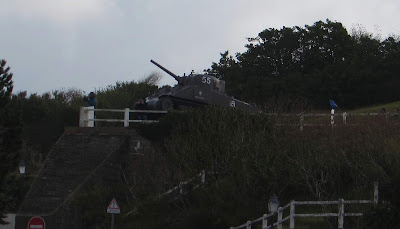My black-and-white knowledge engagement with D-Day ended last October when we had opportunity to visit Normandy during our first ever trip to France. All of those things we have seen in photographs and in televised news reports looked just like the scenes we have seen, but being there colors all those images with life and drama and significance.
The white crosses on the vivid green lawn at the American Cemetery at Omaha Beach are stunning and sobering in equal measure.
The view of the beach itself from the western edge of the cemetery is equally stunning and peaceful.
We attended a short service of remembrance at the circular memorial featuring the "Spirit of American Youth Rising from the Waves" sculpture was singularly moving. We joined in singing the national anthem with a solemnity and dignity I have never experienced during the anthem performances that routinely precede ball games.
After we left the American Cemetery at Omaha Beach, we stopped a short drive away at the memorials that have been erected on and near the beach. The memorials are terrific reminders of what it cost so many thousands of soldiers in those suicidal landings. The weight of significance is enormous if impossible to describe.
As much as we found the cemetery at Omaha Beach moving, what really stirred my deep sensibilities was our visit to Gold Beach, site of the British landing on D-Day, where our tour had stopped to visit the British museum commemorating their sacrifices and to have lunch in the little village of Arromanches-les-Bains.
Every element of that short visit contributed to a sense transcending drama. The wind coming off the English Channel was cold and hard, the Channel was grey and choppy, the sky was full of sunlight and dark, scudding clouds. The now quiet and quaint village rises from the beach up a steep grade of hills.
Here and there reminders of the war are positioned to allow non-participants like me to imagine how the now familiar narrative played out -- a tank on a low promontory beside a road near the beach, the remains of a landing craft just visible at high tide, a motorized bicycle of war vintage.
A handful of the bunkers just south of the town have been preserved for pilgrims and tourists to walk through. We did. I took photographs of the English Channel from one of the better preserved bunkers to get an idea what German soldiers might have been looking and shooting at. I must confess that this brief moment inside the bunker left me feeling trapped and vulnerable.
Fourteen months after D-Day on the other side of the world, our atomic bombs did their terrible work on Hiroshima and Nagasaki. Those bombs were necessary, so the best rationale goes, to avoid a D-Day kind of assault on the coast of Japan. Both choices were horrifying. My father's ship was in the Pacific steaming toward Japan when the bombs were dropped, so his role was part of the occupation near Nagasaki rather than part of an unimaginable assault.
The sacrifice of those who joined these war efforts must not be forgotten nor minimized. I know that. I know that victory is better than loss. And I know that evil must be confronted.Yet I am inclined to agree with William Stafford's assessment that "every war has two losers." The price is heavy -- even for the winners.
What puts the whole matter into perspective for me during our late fall trip to Normandy was a wall mural in the little village of Arromanches-les-Bains just a half block from the sands of Gold Beach. The last word, here, belongs to the little girls.











